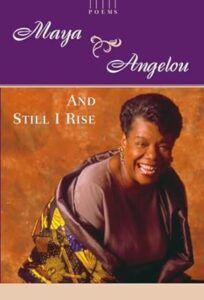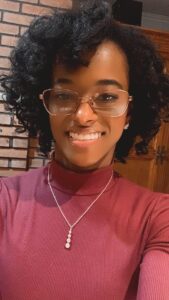Editor’s note: Welcome our new blogger, Danielle Pitter, published poet and graduate student assistant from the Master of Information Program at the School of Communication & Information at New Brunswick Libraries. Her debut post, an inspiration to read more, follows up on other graduate students’ recommendations on how to keep reading for fun (and sanity) while fulfilling the rigorous requirements of graduate studies.
I’ve read only two books this half-year. Two. Is there something wrong with me? Am I not reading enough? Am I falling out of love with reading?
When the new year began, I felt so confident in how many books I would be reading. Last year, I read about 32 books of my goal of 20 from my Goodreads Challenge. That was amazing!! And I think it was because I chose books I genuinely wanted to read. Also, several books I had read were school-related because I took two reading classes, 548: YA Reading & Literacy and 585: Reading Interests of Adults. So I had some incentive for reading. Those two classes gave me the inspiration to keep reading!
But now that I don’t have those classes anymore, it’s getting harder to find the desire—not just the time and energy—the desire to read. Whether I pick up an older book from my back catalog or my most recent TBR (To Be Read), the desire to read hasn’t been there as much.
 This year, I read two books so far: And Still I Rise by the late great Maya Angelou and Perfect Chemistry by my Patreon buddy Cave Marie. Both books affected me in different ways. Being a poet myself, I found Maya’s book to be very inspirational and otherwordly. Maya knows how to captivate her audience and readers and make them think deeper about the world around them. One of my best friends, Tracy, gave me this book for my 29th birthday two years ago, and I’d just never finished it. But something inside me told me to finish the little 40-page book already. And I’m so happy that I did!
This year, I read two books so far: And Still I Rise by the late great Maya Angelou and Perfect Chemistry by my Patreon buddy Cave Marie. Both books affected me in different ways. Being a poet myself, I found Maya’s book to be very inspirational and otherwordly. Maya knows how to captivate her audience and readers and make them think deeper about the world around them. One of my best friends, Tracy, gave me this book for my 29th birthday two years ago, and I’d just never finished it. But something inside me told me to finish the little 40-page book already. And I’m so happy that I did!
 Perfect Chemistry literally made me cry. I’d first read the original version on Marie’s Patreon page as it was being updated weekly earlier this year, and I thought it was such an incredible take on both second chances and the reproductive/fertility issues that women sometimes encounter. It broke my heart to read Kai and Katie’s journey together, making their way back to each other after being separated for so long. I loved the Patreon version so much that I requested the published version from Marie when her book got published on Amazon!
Perfect Chemistry literally made me cry. I’d first read the original version on Marie’s Patreon page as it was being updated weekly earlier this year, and I thought it was such an incredible take on both second chances and the reproductive/fertility issues that women sometimes encounter. It broke my heart to read Kai and Katie’s journey together, making their way back to each other after being separated for so long. I loved the Patreon version so much that I requested the published version from Marie when her book got published on Amazon!
Other than these two books, I have been scraping by trying to read more books this year.
I think because I’m doing more activities like traveling, going out with my nieces and my mom, and doing volunteer work with the New Jersey Library Association, I’ve lost the need to read. Something that I’ve been doing since I was a child, always having a book in my hand, reading in school during class, sometimes locked away in my room for hours, inhaling words on the page like they were the only things I had in my life. This hobby that I’ve somehow turned into a career and graduate school major is now making me fall out of love with reading. Maybe because I’ve been doing it for so long, in many variations. Or maybe I’m just outgrowing the types of books I’m usually into. Who knows?
What I do know is that there are ways to fall back in love with reading. The same way there are methods to falling back in love with someone, or an old hobby you used to love. Here are some ways I’ve found that have helped me fall back in love with reading.
1. Use Online Book Recommendations
One way I fell back into love with reading was using online book recommendation resources like NoveList. The database has many features that help connect readers to books, like their Read-Alikes, Author-Read-Alikes, appeals/tone, and list features. There’s also a version for children and young adults, called NoveList K-8 Plus.
Here’s an introduction to NoveList from my Database of the Week project for my class this past semester, 530: Search and the Information Landscape
2. Reach out to a Subject Specialist
In Rutgers Libraries, reaching out to a subject specialist helped me get a better understanding of my reading tastes. Subject specialists are librarians who are specialized in a specific area, such as English Literature, Humanities, Social Sciences, African Studies and the Classics. Some specialists who are excellent are:
- Tajah Ebram – Black Studies Librarian – Specializes in: Digital Humanities; African Studies; Africana Studies; English Language and Literature
- Francesca Giannetti – Digital Humanities Librarian – Specializes in: Data; Digital Humanities; Humanities; Classics; English Language and Literature; French Language and Literature; Italian Language and Literature
- Thomas (Tom) Glynn – British & American History/Political Science Librarian – Specializes in: Humanities; English Language and Literature; History: British Isles; History: North America; Law; New Jerseyana; Political Science
- Jim Niessen – World History Librarian – Specializes in: Humanities; English Language and Literature; German Language and Literature; History: Global; Jewish Studies; Latino, Latin American, and Caribbean Studies; Medieval Studies; Religion; Spanish and Portuguese Language and Literature
Find more subject specialists at the Rutgers University’s Subject Librarians Directory here.
3. Consult Research Guides
What I’ve also found helpful is looking through the research guides created by Rutgers librarians, called LibGuides. Organized into 95 different subjects, these research guides are great tools to help guide readers toward books of interest to them and expand their understanding of literature.
Some great LibGuides in the Rutgers Libraries’ Literatures in English section:
- International Youth Literature Collection – A representative collection of children’s and young adult books, both translated and in their original languages that celebrate writing, visual style and design from outside of this country.
Rutgers Reads is a feature on resources on first-year required reading at Rutgers University Camden.
- Rutgers Reads 2016: Between the World and Me by Ta-Nehisi Coates
- Rutgers Reads 2017: Hidden Figures
- Rutgers Reads 2018: The Underground Railroad
- Rutgers Reads 2019: Evicted by Matthew Desmond
- Rutgers Reads 2020: Work of Nikole Hannah-Jones
4. Create a Reading Log
This was a class assignment that I did throughout the semester a year ago for my class, 585: Reading Interests of Adults. We had to create a reading log for five reading genres: Mystery/Thriller, Romance, Horror, Science Fiction, and Westerns.
For each book from that genre, we had to answer six questions.
- What is the citation?
- What is the genre?
- Are there subgenres within the genre?
- What are the appeal terms? – Terms that could catch a reader’s eye to want to read this book. Examples like “fast (pacing), family-oriented (characterization), sarcastic (tone)”
- Who are the potential readers of this book?
- Write a capsule review (100-150 words). Think of this like an elevator pitch of a book to someone who knows nothing about it. How would you describe this book in 100-150 words?
- Read-Alikes – Research three to five books that are similar to the one you’re reading.
This activity was a lot of fun to do throughout the semester because I constantly had to find new books for each genre to read. If I didn’t like one book from a genre, I would still record my thoughts on the book in my reading log. It allowed me to expand my reading palette and try out some genres I wouldn’t normally read.
Those are some of my favorite ways that I have done to help me fall back in love with reading. Try these methods and see where they take you on your reading journey!
